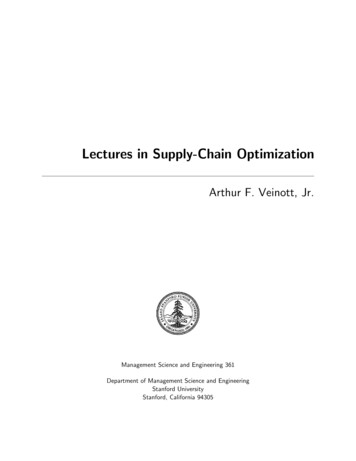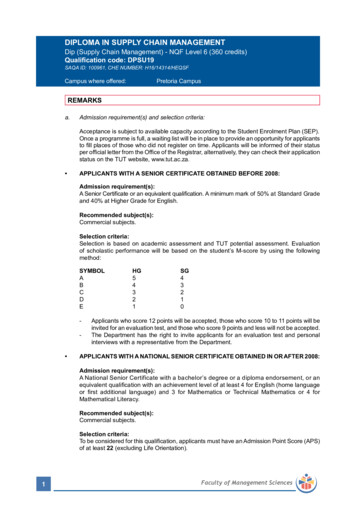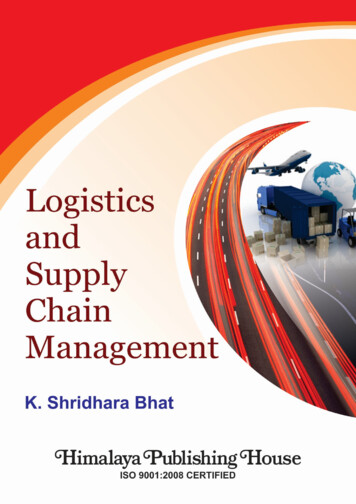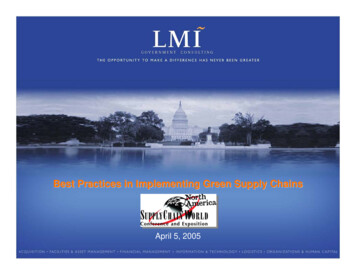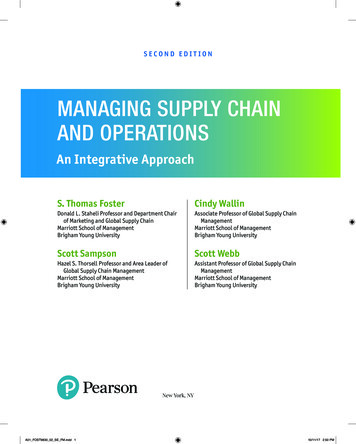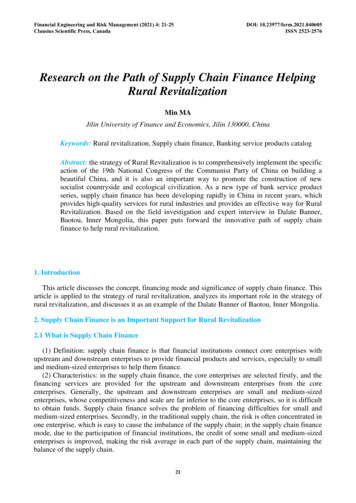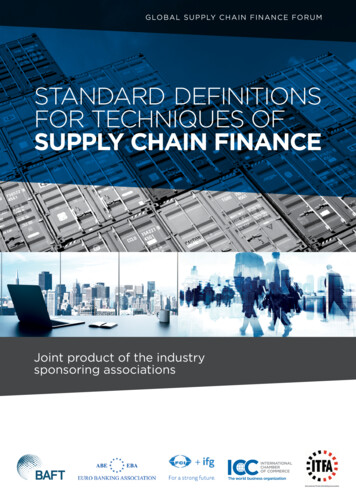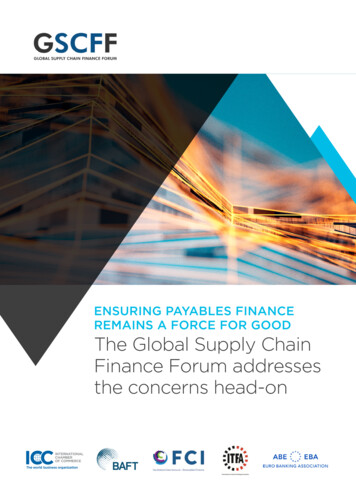
Transcription
ENSURING PAYABLES FINANCEREMAINS A FORCE FOR GOODThe Global Supply ChainFinance Forum addressesthe concerns head-on
ENSURING PAYABLES FINANCEREMAINS A FORCE FOR GOODThe Global Supply ChainFinance Forum addressesthe concerns head-onINTRODUCTIONOver the past decade, payables finance programmes have become a popular means of financingsupply chains—bringing in new pools of investment liquidity from financiers to generate win-winbenefits throughout the supply chain. For the buyer, this means improved payment terms andworking capital optimisation, for the seller this means alternative sources of funding and at lowerrates than most small and medium-sized enterprises (SMEs) can normally access. For both, itmeans more secure and stable supply chains and more sustainable business.Such an arrangement should create benefits on both sides of the transaction. However, it isconcerning to observe certain practices in the market and to read reports that this may not bethe case in some instances, with criticisms emerging regarding these programmes: both theirobjectives and their outcomes.With the focus on transparency, the Global Supply Chain Finance Forum (GSCFF)—made up ofthe major global associations representing the trade finance market: BAFT (Bankers’ Associationfor Finance and Trade), FCI (previously known as Factors Chain International), the InternationalChamber of Commerce (ICC), the International Trade and Forfaiting Association (ITFA) andthe Euro Banking Association (EBA)—outlines the criticisms within this report and provides theindustry’s perspective.The report focuses on three key areas of concern:1. Potential adverse impact on suppliers—especially SMEs—and notably those based indeveloping and emerging markets;2. Financial reporting and transparency;3. Potential credit and liquidity risks associated with these programmes.August 2020 Ensuring payables finance remains a force for good GSCFF addresses the concerns head-on 2
1. What exactly is payables finance?Before addressing the concerns, it is crucial to understand what payables finance is, and how itshould be used. Payables finance is one tool in a suite of solutions falling under the umbrella ofsupply chain finance (SCF). It can be defined as “a buyer-led programme within which sellersin the buyer’s supply chain are able to access finance by means of receivables purchase”.1 Assuch, if the seller elects to be paid earlier than the buyer’s standard terms of engagement, theprogramme provides the option of receiving the discounted value of the receivables (representedby outstanding invoices approved for payment) prior to the actual due date.The cost to the supplier of financing under such a programme is aligned with the credit qualityof the buyer (usually an investment grade-rated entity) and is therefore lower than the cost atwhich the small supplier could borrow on their own. The buyer, meanwhile, pays the total valueof the receivable to the financier on the due date. In this context, the buyer’s creditworthinessassists the seller with improved financing conditions and access to additional liquidity without useof their own credit lines. Such financing helps to underpin the stability and integrity of the entiresupply chain, benefitting not just the buyer and participating supplier.For more information, see our factsheet “Payables finance—how it helps global supply chains”.22. Addressing the concerns: potential impact on suppliers and SMEsThe media have been quoting instances of SMEs reportedly being “bullied” into joiningSCF programmes. Is this common practice? And what is the GSCFF’s view on this?The notion of SMEs being “bullied” could be characterised as somewhat sensationalist, in as muchas the presentation of the issue completely ignores the balance that can be achieved through wellstructured payables finance programmes. This balance involves terms that help the buyer andtherefore assures the health of the overall supply chain, combined with prompt access to fundsfor the supplier on an affordable basis, which helps address the systemic SME cashflow challenge.It is notable that at the peak of the Global Financial Crisis, the UK, the US and other jurisdictionsconsidered encouraging the use of payables finance programmes as a way to pump urgentlyneeded liquidity into domestic supply chains—yet, currently, that same technique is presented bysome as “bullying”. In reality, it is the abuse of such programmes and the abuse of market powerthat can sometimes lead to a bullying dynamic.While such instances regrettably exist, this is not a widespread practice and it is most certainly not“best practice”. Payables finance programmes should be used appropriately and, when they are, canbecome an important financing tool for corporate treasurers and the SME supplier community.Sellers are accustomed to supplying goods and services to their buyers on various terms, with 30 daysfrom invoice date being common, albeit not a formal standard. Buyers may need to increase paymentterms to, say, 45 days (or more) for a variety of reasons, including improving their own working capitalposition or aligning the production and sales cycles. SCF programmes such as payables finance allowsuppliers to be paid before 30 days—in many cases as quickly as five to 10 days.Suppliers that are not in urgent need of cash can opt to receive payment in full on the original duedate. We are very clear on this point: sellers should feel as though they can freely elect to participateor not, when invited, with absolutely no obligation. The GSCFF strongly encourages finance providers1 G SCFF, “2016 Standard Definitions for Techniques of Supply Chain Finance”, -Chain-Finance-Global-SCF-Forum-2016.pdf2 G SCFF, “Payables finance—how it helps global supply chains”, lversion.pdf?m 2/12/2020%203:17:25%20PM& cldee bGR1YXJ0ZUBpY2N3Ym8udWs%3d&recipientid 19b432986b0ecfbfab75e8d&esid 4d6044a3-6d4e-ea11-a812-000d3aba77eaAugust 2020 Ensuring payables finance remains a force for good GSCFF addresses the concerns head-on 3
to follow accepted practice in considering extensions of terms; if a given sector is characterisedby payment terms in the range of 30-60 days, for example, a programme based on 120-day termsmight need to be supported by clear rationale, or may be deemed outside of the typical parametersfor that industry sector. That fact in isolation would not make the proposed programme structureinappropriate, but financiers and buyers deploying such solutions may attract queries.The question of market power has long been understood as a challenge in developing and deployingpayables finance programmes. Most payables finance programmes are therefore structured in amanner that allows suppliers to avail themselves of early payment without this being made visibleto the buyer. The intent has always been to provide balanced benefits to both trading partners.As with other established forms of trade financing, such as Documentary Letters of Credit, theGSCFF and the global community of trade finance practitioners consider that good faith and agenuine desire to do business to mutual benefit should underpin payables finance programmes.The benefits of the programmes should speak for themselves.Would you agree that some buyers’ intentions when implementing payablesprogrammes are to generate a working capital benefit for themselves, notfor their suppliers?The primary aim of a payables programmes is to generate a win-win for buyer and seller in termsof working capital benefits. Buyers pay on standard industry terms and sellers can choose toreceive payment early, or at the original maturity.The payables finance programme itself may well be initiated by the buyer in order to improve itsworking capital cycle, but such programmes would not work if the seller/supplier did not also seea benefit in accessing early payment facilities—otherwise they would not (and should not) agreeto participate.A payables finance programme is put in place in the ordinary course of business under standardindustry-specific payment terms. A seller has the choice not to discount their receivables/invoicesor not to sell to a specific buyer on terms that they cannot and do not choose to support. Thenotion of suppliers being “bullied” is deeply concerning, although the GSCFF observes that mostbuyers are establishing such programmes to further support their suppliers and, at the same time,better secure their own supply chains and production lines.In terms of generating working capital for the supplier, most programmes offer a less costlyalternative than overdrafts or corporate loans.In Australia, the ombudsman for small businesses has accused large corporatesof pressuring suppliers to join SCF programmes and claimed financial intermediariesare using artificial intelligence (AI) to extract excessive returns from smaller firms.Do you agree with the ombudsman in this respect?AI can be utilised to set up new, or further optimise existing, financial programmes of any kind.AI is a powerful tool for evaluating risk, enabling banks and other providers to establish pricingand attract liquidity. Yes, it can be misused, which the GSCFF condemns. How the intelligencegenerated from AI is used and how it is ultimately translated into concrete measures is somethinga particular buyer needs to decide according to their own business policy and corporate ethics.The GSCFF condemns exploitative pricing that is not warranted by the risk the financing provideris taking and is against using AI for such purposes. From this perspective, AI should promote andsupport the original objectives of the programmes: to generate win-win scenarios for both buyerand seller by attracting new sources of liquidity into supply chains.August 2020 Ensuring payables finance remains a force for good GSCFF addresses the concerns head-on 4
Finally, it is worth noting that the ombudsman also highlighted the benefits of payables finance inthe same report.3Payment terms have been a key area of criticism for SCF programmes—with dayspayable increasing 30 to 45, 60 or even 90 days (and since the COVID-19 crisis, therehave even been instances reported of 180 days). To avoid such terms, it is said thatsuppliers are “encouraged” to accept a discounted payment on their original termsvia a related financing organisation. Some authorities are considering curtailing thispractice.Do you agree that curtailing such practices would be a good idea?In order for a SCF programme to be labelled a “payables finance” programme, certain parametersmust be respected. This generally means that tenors do not exceed 180 days (or 360 days on anexceptional basis). A number of the cases in which buyers have attempted to lengthen paymentterms are short-term reactions to the unprecedented COVID-19 situation and are not reflectiveof the payables finance industry as a whole, nor should they continue in the longer-term.Ultimately, industry-aligned payment terms ought to guide the structuring of programmes,acknowledging that those terms vary by sector, and that exceptional circumstances—orlegitimate, commercially-agreed practice—can evolve, that is beyond the more common terms.Generally, payment terms are subject to negotiation between the trading parties in which neitherparty is pressured into accepting them. Banks and other finance providers leave such discussionsto the discretion of the contracting parties and their accountants.Does the GSCFF believe there should be a legal requirement in place restrictingenforced payment terms?Late payment legislation already exists in many countries and at a European Union level.Permissible terms vary with the competent authorities policing the rules. Our recommendation isto appeal to the stakeholders and motivate parties to negotiate fair industry standard terms thatare acceptable and beneficial for both sides.In principal, the GSCFF supports the notion of freedom of contract in which trading partners(sellers and buyers) enter into contracts based on mutual agreement and free choice.3. Addressing the concerns: accounting implicationsWith respect to SCF programmes, ratings agencies have been pushing for reforms tocompanies’ financial disclosures. Originally pushing for cash received via the programmesto be recognised as bank debt, Moody’s has since softened its approach, advocating nowfor corporates to disclose SCF programmes as a potential risk to liquidity. Would you agreewith the rating agencies’ position that these programmes do represent a risk to liquidity?In our view, the liabilities arising from SCF programmes do not create additional financial riskabove and beyond those that already exist in trade between a buyer and a seller. Loan facilitiesusually contain wording that allow them to be suspended when negative events occur. A SCFprogramme, if undertaken by a corporate in poor financial condition, is no different.Negative outcomes can be avoided by implementing strong credit analysis of a corporate’sbalance sheet before engaging in a SCF programme.3 A ustralian Small Business and Family Enterprise Ombudsman, “Supply Chain Finance t 2020 Ensuring payables finance remains a force for good GSCFF addresses the concerns head-on 5
Given that there was no disclosure in the accounts of Carillion plc before its collapse,disclosure remains a prominent issue. What is the GSCFF doing to promote the use ofSCF in a manner that ensures transparency and understanding of the risks involved?The GSCFF has undertaken extensive work to promote strong industry standards as well asagreed definitions, including the release of the Standard Definitions for Techniques of SupplyChain Finance.4 In addition, the GSCFF has been working on a series of additional guidancedocuments for the techniques included in the Standard Definitions. The first report, on receivablesdiscounting, was published in June 2019.5 The next guidance paper in the series will coverpayables finance and is expected to be released in the second half of 2020. The BAFT GlobalTrade Industry Council (GTIC) Payables Finance Principles document, also to be released thisAugust, will prove another strong reference document in this respect.6In the US and elsewhere, calls are growing for buyers to disclose their use of SCF incompany filings after concerns it can be used to obscure a company’s true financial position.Do you believe there should be more transparency with respect to financial reporting?The GSCFF is highly supportive of transparency as it relates to the usage of these programmes.We recognise the need to develop proper parameters for disclosure in corporates’ financialstatements in coordination with accounting standards bodies—but also recognize the challengesthat may arise in deciding how to implement these.4. Addressing the concerns: risk of programmesAt what point, in the view of the GSCFF, does a payables finance programme becomemore risky than rewarding for those involved? And do you agree that the risk isdifferent for the buyer and supplier, with more risk to the (usually smaller) supplier?It should be remembered that the main risks are taken by the finance providers, particularly withregards to the buyer’s creditworthiness. This can be managed by appropriate credit analysis, aspreviously mentioned, with the trade-off generally remaining in equilibrium for the duration ofthe programme.Suppliers are greatly helped by the source of liquidity which, as we have pointed out, is availableat better rates than they would normally be able to obtain. The smaller the supplier, the greaterthe benefit as their sources of finance are generally more expensive and more constrained.The greater risk concentration and alignment with reverse factoring (a variant ofpayables finance) compared to conventional factoring increases the likelihood that thefacility may be curtailed if the sponsoring customer suffers material credit stress. Isconventional factoring therefore a less risky option for parties involved?The primary difference between a traditional and reverse factoring/payables finance programmeis the concentration risk of a debtor when a financier funds suppliers. In a traditional factoringscenario, the finance provider takes the risk of a portfolio of debtors (customers of the seller)—thereby diversifying the risk. If one debtor experiences financial difficulty, the finance providerwill still have other debtors under the factoring programme to rely on for the continued viability4 G SCFF, “2016 Standard Definitions for Techniques of Supply Chain Finance”, obal-SCF-Forum-2016.pdf5 G SCFF, “Receivables Discounting Technique - Market Practices in Supply Chain F-Receivables-Discounting-Common-Practices.pdf6 BAFT, https://www.baft.org/August 2020 Ensuring payables finance remains a force for good GSCFF addresses the concerns head-on 6
of its business. In a reverse factoring programme, however, the risk is concentrated on one debtor(referred to as the “anchor buyer”). In these programmes, the debtor is normally an investmentgrade credit, and the likelihood of curtailment of the programme is diminished.Also, due to the low quantitative risk associated with reverse factoring/SCF programmes—andthe ability to pass on the low cost of finance to the sellers based on the strength of the balancesheet of the anchor buyer—the cost of finance is lower than that of an overdraft or loan. Bycontrast, the cost of traditional factoring is higher as there is normally some recourse back to theseller, hence the risk is greater. Clearly, the seller is leveraging the credit analysis expertise of thefinance provider on the buyer. If a finance provider opts to reduce the buyer facility and no longerpurchases the receivables from the seller, the seller would be forced to discontinue the programas they would no longer receive requests to discount.Some newspapers have reported that increased use of supply chain finance dueto COVID-19 brings additional risk to the system—as these are simply credit linesthat banks can withdraw at a moment’s notice. Does the GSCFF believe this to be alegitimate risk?SCF in general, and payables finance in particular, is a long-term business solution thatcorresponds to stable and long-standing relationships between business partners. Credit linesprovided by banks will usually reflect the financial need of these business partners. If a situationlike COVID-19 calls for more credit, banks will do their best to satisfy incremental demand.Certainly, it would be counter-productive and inappropriate to swiftly withdraw credit lines—creating more distress for both the buyer and the seller. Our expectation is that banks will attemptto help their clients and their sellers to survive in these critical times. Indeed, we understand therehave been a number of cases where credit lines have been extended and buyers were given extratime to pay. This is a very important, if short-term, way to provide financial relief and is, no doubt,welcomed by corporate treasurers looking for ways to overcome the current crisis.CONCLUSIONMisuse of payables finance and reports of suppliers being forced into accepting unfavourableterms are extremely worrying for the GSCFF—yet our understanding is that these incidentsremain isolated and uncommon. We believe that, while they have attracted significant mediacoverage, they are not representative of how payables finance programmes are used by themajority of buyers and sellers in mutually supportive supply chains.If correctly implemented, it is clear that payables finance is a means for buyers and sellers tooptimise their working capital and strengthen their relationships with each other. It is our goalto ensure that this is correctly implemented across all industries and geographies.We believe that fostering increased understanding of SCF, its benefits and how it can be bestused it in line with standard market practice is crucial to achieving this goal. While we have madesignificant strides in this respect since the launch of the Standard Definitions for Techniques ofSupply Chain Finance in 2016, we accept that more must be done.To this end, we plan to continue to release further guides on SCF techniques, to help educateand guide best practice by banks, fintechs, buyers and suppliers.Supporting SMEs is at the very top of the agenda for the GSCFF, and all of its participatinginstitutions. The launch of ICC’s “Save our SMEs” campaign in March 2020 is just one exampleof the industry’s unwavering commitment to ensuring SMEs receive the funding they need,and that business works for everyone, everywhere, every day.August 2020 Ensuring payables finance remains a force for good GSCFF addresses the concerns head-on 7
Key contributors to this reportThe International Chamber of Commerce (ICC), BAFT, the International Trade and ForfaitingAssociation (ITFA), FCI, Opus Advisory Services International Inc. and the Euro BankingAssociation (EBA)Christian HausherrChairman, GSCFFProduct Manager Trade Finance/Supply Chain Finance EMEA, Deutsche BankDavid BischofDeputy Director, Finance for Development, ICCStacey FacterSenior Vice President – Trade Products, BAFTTod BurwellPresident & CEO, BAFTSean EdwardsChairman, ITFAHead of Legal EMEA, Sumitomo Mitsui Banking Corporation (SMBC)Peter MulroySecretary General, FCIAlexander R. MalaketPresident, OPUS Advisory Services International Inc.August 2020 Ensuring payables finance remains a force for good GSCFF addresses the concerns head-on 8
International Chamber of CommerceThe International Chamber of Commerce (ICC) is the institutional representative of more than 45million companies in over 100 countries. ICC’s core mission is to make business work for everyone,every day, everywhere. www.iccwbo.orgBAFTBAFT is the leading international transaction banking association, providing advocacy, thoughtleadership, education and training, and a global forum for its members in the areas of tradefinance, payments, compliance, and regulations. www.baft.org/ITFAThe International Trade and Forfaiting Association, ITFA, is the worldwide trade association forcompanies, financial institutions and intermediaries engaged in global trade, forfaiting, supplychain and receivables financing. https://itfa.org/FCIFCI is the global representative body for factoring and financing of open account domestic andinternational trade receivables, with close to 400 member companies in 90 countries. www.fci.nlOPUS Advisory Services Inc.OPUS Advisory Services International Inc. is a Canadian consultancy established in 2001, focusedon international business, trade and investment, including trade finance and supply chain finance.www.opus-advisory.com/EBAThe Euro Banking Association (EBA) is a practitioners’ body for banks and other service providerssupporting a pan-European vision for payments. www.abe-eba.eu/August 2020 Ensuring payables finance remains a force for good GSCFF addresses the concerns head-on 9
ABOUT THE GLOBAL SUPPLY CHAIN FINANCE FORUMThe Global Supply Chain Finance Forum was established in 2014 to develop, publish and championa set of commonly agreed standard market definitions for Supply Chain Finance (SCF). Comprisedof trade bodies BAFT (Bankers’ Association for Finance and Trade), FCI, the International Chamberof Commerce (ICC), the International Trade and Forfaiting Association (ITFA) and the EuroBanking Association (EBA) the industry consortium leverages its collective footprint to aid thetarget audience of SCF in gaining clarity and consistency on the various terms and techniquesused. The main objective of GSCFF is to support the sustainable growth of supply chain financeby establishing consistency and a standardized understanding of SCF across the industry.Subsequently, the GSCFF strives towards acknowledgement of its definitions and their benefitsby its target audience, in specific on the regulatory side. The Forum monitors and reacts to majormarket developments in all relevant matters for Supply Chain Finance. It is open to financialinstitutions, non-FI Finance providers, accounting firms, investors, rating agencies, regulators andcorporates who have a stake in supply chain finance.
should be used. Payables finance is one tool in a suite of solutions falling under the umbrella of supply chain finance (SCF). It can be defined as "a buyer-led programme within which sellers in the buyer's supply chain are able to access finance by means of receivables purchase".1 As
